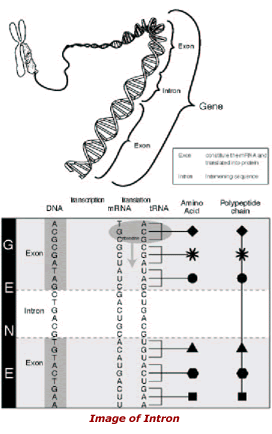Last updated: April 26, 2013
1977: Introns Discovered
1977: Introns Discovered
 Richard Roberts' and Phil Sharp's labs showed that eukaryotic genes contain many interruptions, called introns.
Richard Roberts' and Phil Sharp's labs showed that eukaryotic genes contain many interruptions, called introns.
Before 1977, the mRNA molecules that ferry information from DNA to ribosomes (the parts of cells that make proteins) were believed to be faithful copies of the DNA, with each mRNA molecule aligning exactly with the stretch of DNA encoding it. This was true in bacteria.
So, scientists were startled by evidence that that the genes in eukaryotic cells (like those in animals, plant, and fungi) have interruptions. The intervening DNA segments appeared to loop out, as observed under a microscope, after mRNA was allowed to pair with the DNA it derived from. With restriction enzymes that revealed the sizes of DNA segments, Roberts and Sharp confirmed that eukaryotic mRNA molecules are indeed shorter than their corresponding genes; the mRNA miss large gaps called introns. After RNA is transcribed from DNA, the introns are cut out before the mRNA is translated into protein.
The discovery of split genes changed the way scientists thought about the architecture of the genome. Human genes are on average interrupted about 10 times, and the introns typically contain about 90 percent of the DNA sequence in the whole gene. Most of the "non-coding" regions (which aren't translated into protein) are generally thought of as "junk DNA" - as filler sequences that apparently serve no purpose.
More Information
References:
Chow, L.T., Roberts, J.M., Lewis, J.B., Broker, T.R. A map of cytoplasmic RNA transcripts from lytic adenovirus type 2, determined by electron microscopy of RNA:DNA hybrids. Cell, 11(4): 819-36. 1977. [PubMed]
Berk, A.J., Sharp, P.A. Sizing and mapping of early adenovirus mRNAs by gel electrophoresis of S1 endonuclease-digested hybrids. Cell, 12(3): 721-32. 1977. [PubMed]
Berget, S.M., Sharp, P.A. A spliced sequence at the 5'-terminus of adenovirus late mRNA. Brookhaven Symp Biol, 29:332-44, 1977. [PubMed]
Roberts and Sharp won the 1993 Nobel Prize in Physiology or Medicine "for their discoveries of split genes".

« Previous Event | Next Event »
